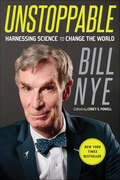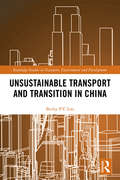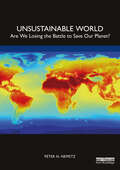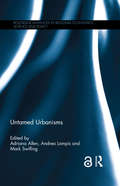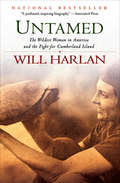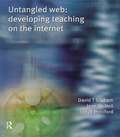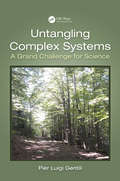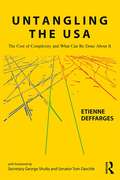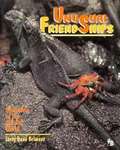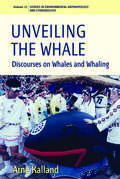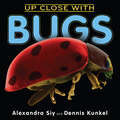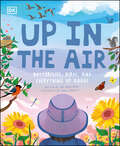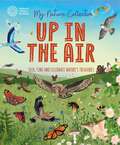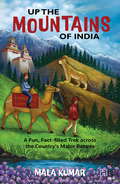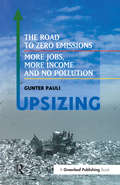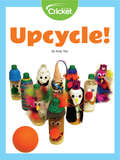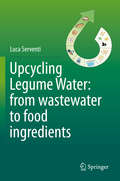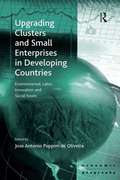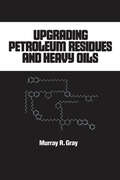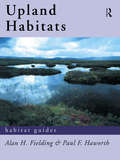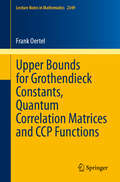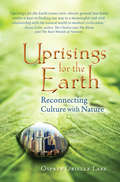- Table View
- List View
Unstoppable: Harnessing Science to Change the World
by Bill Nye“Climate change is coming. What can we do about it? TV’s ‘Science Guy’ has some answers. . . . An important message delivered in a winning manner.” —Kirkus ReviewsJust as World War II called an earlier generation to greatness, so the climate crisis is calling today’s rising youth to action: to create a better future.In Unstoppable, Bill Nye expands the message for which he is best known and beloved. That message is that with a combination of optimism and scientific curiosity, obstacles become opportunities, and the possibilities of our world become limitless. With a scientist’s thirst for knowledge and an engineer’s vision of what can be, Bill Nye sees today’s environmental issues not as insurmountable problems but as chances for our society to rise to the challenge and create a cleaner, healthier, smarter world. We need not accept that transportation consumes half our energy, and that two-thirds of the energy you put into your car is immediately thrown away out the tailpipe. We need not accept that dangerous emissions are the price we must pay for a vibrant economy and a comfortable life. Above all, we need not accept that we will leave our children a planet that is dirty, overheated, and depleted of resources. As Bill shares his vision, he debunks some of the most persistent myths and misunderstandings about global warming. When you are done reading, you’ll be enlightened and empowered. Chances are, you’ll be smiling, too, ready to join Bill and change the world.
Unsustainable Transport and Transition in China (Routledge Studies in Transport, Environment and Development)
by Becky PY LooThis book discusses various transport sustainability issues from the perspective of developing countries, exploring key issues, problems and potential solutions for improving transport sustainability in China. It first reviews the current transport sustainability baselines in the three key dimensions of environmental, economic and social sustainability, via an international comparison encompassing both developed and developing countries in different world regions. Then, with a time frame up to 2030, the study groups 100 major Chinese cities according to their baseline conditions, projected population and economic growth, and common sustainability challenges in passenger transport. A systematic attempt is made to discuss the characteristics, strengths and weaknesses of various emerging sustainable transport strategies, including the metro systems, bus rapid transit, light rail, bicycles (and e-bicycles), electric vehicles and walking. Based on the different city clusters identified, the study then explores the opportunities and constraints of introducing a range of emerging sustainable transport strategies through both statistical analysis and detailed fieldwork. Future directions and challenges are identified based on official documents, onsite observations and interviews with local people. The study concludes with thoughts on sustainable transport in smart cities, the importance of governance, local participation, internal and external city movements, and towards a holistic sustainable transport plan. Unsustainable Transport and Transition in China will be of great interest to scholars interested in carbon emissions, climate change, environmental policy, planning, road safety, sustainability, transportation and urban studies, and is relevant to China and other developing countries.
Unsustainable World: Are We Losing the Battle to Save Our Planet?
by Peter N. NemetzUsing a cross-disciplinary, science- and economics-based approach, this book provides a sobering and comprehensive assessment of the multifaceted barriers to achieving sustainability at a global level. Organized into three parts, the book defines sustainability in part I and sets the context of the historical and current difficulties facing the world today. In parts II and III, it outlines the sustainability challenges faced in transportation, manufacturing, and agriculture, and then in turn addresses the solutions, conditional solutions, and nonsolutions to these challenges. These include electric and autonomous automobiles, nuclear power, renewable energy, geoengineering, and carbon capture and storage. The author attempts to differentiate among those proposed solutions and discusses which are most promising and which are infeasible, counterproductive, and potentially a waste of time and money. In each of the book’s chapters, the scientific evidence is presented in detail, in keeping with the advice of the young Swedish climate activist, Greta Thunberg, to let the science speak for itself. The author outlines why sustainability is unlikely to be achieved in several key areas of human endeavor and readers are challenged to weigh the scientific evidence for themselves. Using an economic business-based approach, this book introduces students and general readers to the challenges of sustainability and the environmental difficulties facing humanity today.
Untamed Urbanisms (Routledge Advances in Regional Economics, Science and Policy)
by Adriana Allen Mark Swilling Andrea LampisAn electronic version of this book is available Open Access at www.tandfebooks.com. It has been made available under a Creative Commons Attribution-Non Commercial-No Derivatives 3.0 license. One of the major challenges of urban development has been reconciling the way cities develop with the mounting evidence of resource depletion and the negative environmental impacts of predominantly urban-based modes of production and consumption. This book aims to re-politicise the relationship between urban development, sustainability and justice, and to explore the tensions emerging under real circumstances, as well as their potential for transformative change. For some, cities are the root of all that is unsustainable, while for others cities provide unique opportunities for sustainability-oriented innovations that address equity and ecological challenges. This book is rooted in the latter category, but recognises that if cities continue to evolve along current trajectories they will be where the large bulk of the most unsustainable and inequitable human activities are concentrated. By drawing on a range of case studies from both the global South and global North, this book is unique in its aim to develop an integrated social-ecological perspective on the challenge of sustainable urban development. Through the interdisciplinary and original research of a new generation of urban researchers across the global South and North, this book addresses old debates in new ways and raises new questions about sustainable urban development. .
Untamed: The Wildest Woman in America and the Fight for Cumberland Island
by Will HarlanCarol Ruckdeschel is the wildest woman in America. She wrestles alligators, eats roadkill, rides horses bareback, and lives in a ramshackle cabin that she built by hand in an island wilderness. A combination of Henry David Thoreau and Jane Goodall, Carol is a self-taught scientist who has become a tireless defender of sea turtles on Cumberland Island, a national park off the coast of Georgia.Cumberland, the country’s largest and most biologically diverse barrier island, is celebrated for its windswept dunes and feral horses. Steel magnate Thomas Carnegie once owned much of the island, and in recent years, Carnegie heirs and the National Park Service have clashed with Carol over the island’s future. What happens when a dirt-poor naturalist with only a high school diploma becomes an outspoken advocate on a celebrated but divisive island? Untamed is the story of an American original standing her ground and fighting for what she believes in, no matter the cost.
Untangled Web: Developing Teaching on the Internet
by Lloyd Pettiford David T Graham Jane McNeilThe internet and world wide web are revolutionizing many aspects of our lives, and have become an accepted part of socioeconomic experience in developed countries. For entertainment, shopping, banking, establishing friendships, seeking information, and so on, the web is the first port of call for an increasing number of people. A few in education have been quick to see the potential of the web as a platform for delivering a variety of teaching and learning materials. Many more, however, would like to make use of the web, but lack either the time or the skills, or both. Untangled Web provides a guide for those wishing to develop their own teaching and learning resources on the web, whether for local, open or distance learning. By using this book, potential web educators can acquire some of these basic skills and save time by drawing on the experiences of the authors and avoiding the pitfalls and problems that they have encountered. The authors have gained considerable expertise in devising, designing, constructing, testing, adapting and evaluating their own web-based instruction packages which have been developed over a number of years and involve a variety of subject areas. Untangled web is therefore very much focused on practical experience, and while it is primarily aimed at teachers in further and higher education, schoolteachers interested in using the web as a teaching and learning medium will find it useful. Untangled Web has been written by an experienced team from the Department of International Studies at the Nottingham Trent University. David Graham teaches geography and information technology; Jane McNeil is Faculty webmaster and teaches medieval history and information technology; Lloyd Pettiford teaches international relations.Innovative guide to using the web in teaching and learning, providing practical advice for lecturers and teachers on using the web as more than just a support tool
Untangling Complex Systems: A Grand Challenge for Science
by Pier GentiliComplex Systems are natural systems that science is unable to describe exhaustively. Examples of Complex Systems are both unicellular and multicellular living beings; human brains; human immune systems; ecosystems; human societies; the global economy; the climate and geology of our planet. This book is an account of a marvelous interdisciplinary journey the author made to understand properties of the Complex Systems. He has undertaken his trip, equipped with the fundamental principles of physical chemistry, in particular, the Second Law of Thermodynamics that describes the spontaneous evolution of our universe, and the tools of Non-linear dynamics. By dealing with many disciplines, in particular, chemistry, biology, physics, economy, and philosophy, the author demonstrates that Complex Systems are intertwined networks, working in out-of-equilibrium conditions, which exhibit emergent properties, such as self-organization phenomena and chaotic behaviors in time and space.
Untangling the USA: The Cost of Complexity and What Can Be Done About It
by Etienne DeffargesTom Brady and the “tuck rule”; “Nobody knew health care could be so complicated”; “The financial world has become way too complicated and very secretive.” What could Tom Brady, Donald Trump, and Michael Lewis possibly have in common? Complexity. Lewis has analyzed it; Trump has discovered it; Brady has benefited from it. And the USA is entangled in it. Complex systems are an inevitable part of business and socio-economic structures. We reach a breaking point, however, when social and organizational structures become cumbersome and unintelligible. Entire new systems need to be constructed just to manage this complexity, with questionable or negative value to society at large. The outcome is high costs, poor results, deepening social inequality, and the erosion of public trust. Wholesale changes must be contemplated. This is particularly true in the USA today, where complexity is piled upon complexity in a number of critical sectors, such as health care, energy, finance, and government. The author takes a common sense, broad-based, and analytical approach to some of the most complicated issues facing the US today. He examines the costs of complexity through a wide-angle lens, provides analysis of the root causes involved, and explains what is necessary to improve results and lower costs. The ever-increasing level of complexity in the US is compared to that in other developed economies. History is referenced as a guide to show that in many areas, America’s success has relied on simple and elegant solutions. These contrasting paths are used to propose alternative approaches and new solutions. Beyond analyzing how incredibly complex socio-economic systems have emerged in recent years in the US, the author steps back, reflects on the fundamental values of this country, and offers a number of actionable proposals to improve the lives of all American citizens. Etienne Deffarges has enjoyed a successful career, first as a senior strategy consultant to many leading global companies, then as a heath care technology entrepreneur in the US. He is perfectly positioned to observe how complex systems are stifling socio-economic progress. He brings a unique insider view of the issues involved and examines a number of key sectors that impact American society at large, including health care, energy, finance, regulations, taxation, utilities, and welfare.
Unusual Friendships: Symbiosis in the Animal World
by Larry Dane BrimnerExplores the fascinating and surprising relationships formed by different species for survival, protection, or food.
Unveiling The Whale
by Arne KallandWhaling has become one of the most controversial environmental issues. It is not that all whale species are at the brink of extinction, but that whales have become important symbols to both pro- and anti-whaling factions and can easily be appropriated as the common heritage of humankind. This book, the first of its kind, is therefore not about whales and whaling per se but about how people communicate about whales and whaling. It contributes to a better understanding and discussion of controversial environmental issues: Why and how are issues selected? How is knowledge on these issues produced and distributed by organizations and activists? And why do affluent countries like Japan and Norway still support whaling, which is of insignificant economic importance? Basing his analysis on fieldwork in Japan and Norway and at the International Whaling Commission, the author argues how an image of a "superwhale" has been constructed and how this image has replaced meat and oil as the important whale commodity. He concludes that the whaling issue provides an arena where NGOs and authorities on each side can unite, swapping political legitimacy and building personal relations that can be useful on issues where relations are less harmonious.
Up Close With Bugs
by Alexandra SiyAmazing micrograph photography helps readers find out if bugs get an undeserved bad rap in this nonfiction picture book.Bugs bite, drink blood, and eat food in our fields and gardens. Is bugging a crime? Decide for yourself! Read "rap sheets" on the major categories of insects, and marvel at photomicrographs that magnify bug parts by 10 to 300,000 times! But once you've learned about insect habits, you may come to agree that bugs are our friends... not our foes. Meticulous research combined with lively writing and a kid-friendly approach to turn learning about insects into an intriguing case. First published in hardcover as Bug Shots, this title is being repackaged as a companion to Up Close with Spiders (Spidermania).
Up in the Air (Underground and All Around)
by Zoe ArmstrongLook up! What do you see? This charming nature book will encourage children to look, listen, and feel nature all around. From cloud patterns to constellations, the chirrup of a single sparrow to the trees that rustle in the wind - the beauty of nature is everywhere. This children&’s book is perfect for cultivating a love of natural science.Inside this beautifully illustrated kid's guide, Up In The Air you&’ll discover: • Cross-curriculum science topics covering botany, ornithology, meteorology, and more • Gorgeous illustrations by Sara Ugolotti create a softer approach to scientific topics - perfect for young readers between the ages of 7-9 • Plant and animal species that live above us from all around the world • A guide to bird watching for kids, cloud spotting, and identifying different constellations of stars From the tiny insects that make their homes in tree trunks to the names of the planets and constellations in the sky, there is so much to see in the world above our heads. Young readers will discover the joy nature can bring to us, and build on their understanding of the natural world.Up In The Air is the perfect introduction to climatology, astronomy, and the intricacies of flora and fauna life. Kids will learn about Earth&’s ecosystem and understand why living things are vital for our planet&’s future, whether they are insects pollinating plants, or trees helping to make the air we breathe.
Up in the Air: Seek, find and celebrate nature's treasures with the Natural History Museum (My Nature Collection)
by Cameron MenziesA stunning and interactive exploration of the natural world, celebrating the diversity of natural treasures that fill the air and published in partnership with the Natural History Museum London.My Nature Collection: Up in the Air is filled with beautifully detailed artwork, highlighted natural treasures and hidden features to spot on every page. Fly high into many remarkable airborne habitats and get to know their special features, from moths above a meadow to dust storms sweeping the savannah, from bees that brave the desert skies to clouds that sit among the mountains. Search and find each wonder in context, with answers and further explanations at the back of the book.My Nature Collection book series encourages readers age 7 and up to look carefully and consider Earth's natural habitats in detail through interactive questions and up-close artwork. The perfect collection of books for treasure collectors, fact hunters and all lovers of nature!Series titles include: In the Rainforest / Under the Ground / Under the Sea / Up in the Air
Up in the Garden and Down in the Dirt (Into Reading Texas, Read Aloud Module 8 #2)
by Kate Messner Christopher NealNIMAC-sourced textbook
Up the Mountains of India: A Fun, Fact-filled Trek across the Country’s Major Ranges
by Mala KumarHow did a whale go up the Himalayas?Where would you find a spider shaped like the Sorting Hat in Harry Potter stories?On which peaks and slopes can you find both snow and coffee beans sometimes?Up which hill is the observatory that helped to sight a super-Neptune-sized planet?Put on your climbing boots to find out hundreds of fascinating facts about our country's best-known mountain ranges - the Himalayas, the Trans-Himalayas, the Aravallis, the Vindhyas, the Satpuras, the North-east mountains, the Eastern Ghats and the Western Ghats.Find out how each range was formed, discover the plants, trees and wildlife on them, and do your bit to save them from getting destroyed. Meet amazing communities who live in harmony with nature even now. Clap for the scientists who look under rocks and into tree holes for new species of flora and fauna. And once you have worked up an appetite, the yummy dishes of the hills will fill you right up (bamboo biryani, anyone?).From ice stupas and battles in the snow to floating schools and Titanosaurus eggs, from wool gatherers and medicine makers to the fastest diving bird and a tiger that could win the 'Best Dad' award - this book, filled with photos and illustrations, will take you on an exciting climb up and down the mountains of India.
UpSizing: The Road to Zero Emissions: More Jobs, More Income and No Pollution
by Gunter Pauli"Zero emissions" has become a definitive term in the debate on sustainable development in the last few years. This radical book focuses on a world where the waste for one process can become the raw material for another – a cascade of materials once thought worthless supporting new products, new processes and new wealth – as industries that were previously considered unrelated cluster together. A world where new business will be created on an unprecedented scale. This is not just a theory: projects in the agro-industries, based on integrated biosystems, are already up and running in countries as diverse as Fiji, Namibia and Colombia and are fully described in the book, as is the lead given by Japan in terms of the adoption of the concept. In UpSizing, Gunter Pauli, founder of the Zero Emissions Research Initiative (ZERI), examines how the adoption of the Zero Emissions concept not only radically reduces pollution and waste but can contribute significantly to the generation of income and jobs – specifically for those that need them most: the rural poor in less developed countries.
Upcycle!
by Amy TaoGot a pair of old tights, an empty can or a plastic bottle that you plan to throw away? You can upcycle those old things and turn them into new items you can use! Upcycling is recycling in a better way! Learn how to make a decorative pencil holder, a draft dodger to keep the cold out, or turn plastic bottles into bowling pins. What things can you create to reduce the use of plastic and metal?
Upcycling Legume Water: from wastewater to food ingredients
by Luca ServentiFood manufacturing generates an incredibly high volume of wastewater. The legume industry is one of the top contributors to this environmental issue, as soaking and boiling are necessary to transform dried legumes into cooked canned products and other legume-based products, such as soymilk, tofu, hummus and flours. Wastewater must be treated prior to disposal into the environment, thus raising production costs for the food industry. In addition, wastewater contains nutrients that are lost from the food chain after disposal. As water and soluble nutrients are becoming a limited resource, it is critical to optimize food manufacturing at all levels. Recycling Legume Wastewater Into Food Ingredients presents a sustainable solution to this increasing demand for food and water. The text analyses the composition of legume wastewater and its physicochemical properties, including its potential applications in emulsifiers, foaming agents, gelling agents and antistaling ingredients. Early chapters discuss the processing of legumes and the wastewater generation involved. Further sections focus on wastewater generated by soaking and cooking, including the composition, functional properties, and food applications involved in each. Sprouting water, bioactives and applications in edible packaging are also discussed. In presenting a sustainable solution for legume wastewater use, this text is an important key to sustainability in food processing and the reduction of waste.
Upgrading Clusters and Small Enterprises in Developing Countries: Environmental, Labor, Innovation and Social Issues (Economic Geography Series)
by Jose Antonio Puppim De OliveiraSME's are acknowledged as effective sources of jobs and incomes, gaining an important position in the development agenda, subsequently 'cluster' policies were conceived as a framework to augment the effects of SMEs and to optimize resources used to support them. Based on case studies from Brazil, Vietnam, Indonesia and India, this volume examines SME clusters and argues that unless they counteract common problems such as very low wages, poor working conditions, poor quality products and lack or environmental regulation, they will be pushed out of the market and so become unsustainable. This book suggests that the SME clusters currently being stretched should react by 'socially upgrading' in order to improve their innovation capacity, as well as social, environmental and labour standards. It puts forward conceptual frameworks which explain the way firms can upgrade: through markets, interaction among cluster members, through Corporate Social Responsibility and other such public policy, and through the better enforcement of regulation.
Upgrading Petroleum Residues and Heavy Oils
by R. Murray Gray"This useful reference offers in-depth coverage of current techniques for converting heavy oils and residues into more valuable distillates.Examines the chemistry of heavy hydrocarbon feeds and their properties important to engineering design, including phase behavior, reaction kinetics, and thermodynamic and transport characteristics!"
Upland Habitats (Habitat Guides)
by Alan F. Fielding Paul F. HaworthUpland Habitats presents a comprehensive illustrated guide to the habits wildlife and conservation of Britains last wilderness areas. These include: heather moors, sheep walk deer forest, blanket bogs, montane and sub-montane forests. The book examines the unique characteristics of uplands and the ecological processes and historical events that have shaped them since the end of the last glaciaton. Among the key conservation and management issues explored in are:* modern agricultural practices and economics* habitat degradation through overgrazing* commercial forest plantations* the persecution of wildlife* recreation in the uplands* the funding of upland farming.
Upper Bounds for Grothendieck Constants, Quantum Correlation Matrices and CCP Functions (Lecture Notes in Mathematics #2349)
by Frank OertelThis book concentrates on the famous Grothendieck inequality and the continued search for the still unknown best possible value of the real and complex Grothendieck constant (an open problem since 1953). It describes in detail the state of the art in research on this fundamental inequality, including Krivine's recent contributions, and sheds light on related questions in mathematics, physics and computer science, particularly with respect to the foundations of quantum theory and quantum information theory. Unifying the real and complex cases as much as possible, the monograph introduces the reader to a rich collection of results in functional analysis and probability. In particular, it includes a detailed, self-contained analysis of the multivariate distribution of complex Gaussian random vectors. The notion of Completely Correlation Preserving (CCP) functions plays a particularly important role in the exposition.The prerequisites are a basic knowledge of standard functional analysis, complex analysis, probability, optimisation and some number theory and combinatorics. However, readers missing some background will be able to consult the generous bibliography, which contains numerous references to useful textbooks. The book will be of interest to PhD students and researchers in functional analysis, complex analysis, probability, optimisation, number theory and combinatorics, in physics (particularly in relation to the foundations of quantum mechanics) and in computer science (quantum information and complexity theory).
Uprisings for the Earth
by Osprey Orielle LakeWe face a serious global challenge with over half the world's population living in urban environments -- mostly disconnected from the natural world. This represents a key element of the serious economic, social and environmental crises looming today. Osprey Orielle Lake, a lifelong advocate for the environment and cultural transformation, weaves together history, science, culture, governance, spirituality, and the arts to map out an integrated approach to working in partnership with nature while creating a more just and sustainable future. Lake argues that "a culture or civilization bereft of its connection to nature will not be sustainable -- the decades since Rachel Carson wrote Silent Spring have clearly shown us this. We will need to reconnect with the rhythms of the natural world in contemporary society to generate inner and outer resilience, and to move through the uncertain times ahead."Lake offers a frank inquiry into a variety of causes leading to our current global peril and also provides a deep well of hope and profound insight. Each chapter poetically emerges from a specific geographical region and, with the lively tone of place-based literature, creates a tapestry composed of personal experiences, nature writing, environmental awareness and cultural criticism. Incorporating historical and contemporary voices from many fields of endeavor, Lake encourages people to understand the legacy of information we already possess.Uprisings delves into a new kinship with nature while acknowledging the treasures of urban life and the unique and valuable stake each person has in resolving critical and timely challenges. Whether you are a parent, an activist, a health care professional, a newcomer to recycling, a politician, a lover of nature writing, an historian, or searching for recovery from apathy or hopelessness, consider this book required reading!
Uprisings for the Earth
by Osprey Orielle LakeWe face a serious global challenge with over half the world's population living in urban environments -- mostly disconnected from the natural world. This represents a key element of the serious economic, social and environmental crises looming today. Osprey Orielle Lake, a lifelong advocate for the environment and cultural transformation, weaves together history, science, culture, governance, spirituality, and the arts to map out an integrated approach to working in partnership with nature while creating a more just and sustainable future. Lake argues that "a culture or civilization bereft of its connection to nature will not be sustainable -- the decades since Rachel Carson wrote Silent Spring have clearly shown us this. We will need to reconnect with the rhythms of the natural world in contemporary society to generate inner and outer resilience, and to move through the uncertain times ahead."Lake offers a frank inquiry into a variety of causes leading to our current global peril and also provides a deep well of hope and profound insight. Each chapter poetically emerges from a specific geographical region and, with the lively tone of place-based literature, creates a tapestry composed of personal experiences, nature writing, environmental awareness and cultural criticism. Incorporating historical and contemporary voices from many fields of endeavor, Lake encourages people to understand the legacy of information we already possess.Uprisings delves into a new kinship with nature while acknowledging the treasures of urban life and the unique and valuable stake each person has in resolving critical and timely challenges. Whether you are a parent, an activist, a health care professional, a newcomer to recycling, a politician, a lover of nature writing, an historian, or searching for recovery from apathy or hopelessness, consider this book required reading!
Uprisings for the Earth
by Osprey Orielle LakeWe face a serious global challenge with over half the world's population living in urban environments -- mostly disconnected from the natural world. This represents a key element of the serious economic, social and environmental crises looming today. Osprey Orielle Lake, a lifelong advocate for the environment and cultural transformation, weaves together history, science, culture, governance, spirituality, and the arts to map out an integrated approach to working in partnership with nature while creating a more just and sustainable future. Lake argues that "a culture or civilization bereft of its connection to nature will not be sustainable -- the decades since Rachel Carson wrote Silent Spring have clearly shown us this. We will need to reconnect with the rhythms of the natural world in contemporary society to generate inner and outer resilience, and to move through the uncertain times ahead."Lake offers a frank inquiry into a variety of causes leading to our current global peril and also provides a deep well of hope and profound insight. Each chapter poetically emerges from a specific geographical region and, with the lively tone of place-based literature, creates a tapestry composed of personal experiences, nature writing, environmental awareness and cultural criticism. Incorporating historical and contemporary voices from many fields of endeavor, Lake encourages people to understand the legacy of information we already possess.Uprisings delves into a new kinship with nature while acknowledging the treasures of urban life and the unique and valuable stake each person has in resolving critical and timely challenges. Whether you are a parent, an activist, a health care professional, a newcomer to recycling, a politician, a lover of nature writing, an historian, or searching for recovery from apathy or hopelessness, consider this book required reading!
